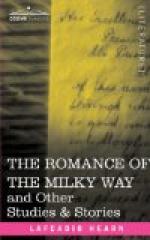[Footnote 74: Shig[’e]hira, after a brave fight in defense of the capital,—then held by the Ta[:i]ra (or H[’e][:i]k[’e]) party,—was surprised and routed by Yoshitsun[’e], leader of the Minamoto forces. A soldier named Iy[’e]naga, who was a skilled archer, shot down Shig[’e]hira’s horse; and Shig[’e]hira fell under the struggling animal. He cried to an attendant to bring another horse; but the man fled. Shig[’e]hira was then captured by Iy[’e]naga, and eventually given up to Yoritomo, head of the Minamoto clan, who caused him to be sent in a cage to Kamakura. There, after sundry humiliations, he was treated for a time with consideration,—having been able, by a Chinese poem, to touch even the cruel heart of Yoritomo. But in the following year he was executed by request of the Buddhist priests of Nanto, against whom he had formerly waged war by order of Kiyomori.]
She rose, and sliding back the screens parting the guest-room from the adjoining chamber, ushered them to their sleeping apartment. Then, with many words of joy and congratulation, she withdrew; and It[=o] was left alone with his bride.
As they reposed together, It[=o] said:—
“Tell me, my loved one, when was it that you first wished to have me for your husband.”
(For everything appeared so real that he had almost ceased to think of the illusion woven around him.)
She answered, in a voice like a dove’s voice:—
“My august lord and husband, it was at the temple of Ishiyama, where I went with my foster-mother, that I saw you for the first time. And because of seeing you, the world became changed to me from that hour and moment. But you do not remember, because our meeting was not in this, your present life: it was very, very long ago. Since that time you have passed through many deaths and births, and have had many comely bodies. But I have remained always that which you see me now: I could not obtain another body, nor enter into another state of existence, because of my great wish for you. My dear lord and husband, I have waited for you through many ages of men.”
And the bridegroom felt nowise afraid at hearing these strange words, but desired nothing more in life, or in all his lives to come, than to feel her arms about him, and to hear the caress of her voice.
* * * * *
But the pealing of a temple-bell proclaimed the coming of dawn. Birds began to twitter; a morning breeze set all the trees a-whispering. Suddenly the old nurse pushed apart the sliding screens of the bridal-chamber, and exclaimed:—




